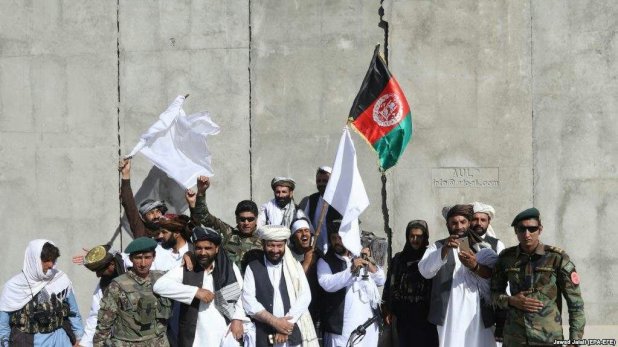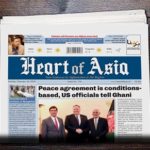By all accounts, the US and the Taliban are poised to sign the initial stage of a peace deal in Afghanistan, and it may only be a matter of weeks before President Donald Trump takes the first serious step toward ending America’s longest war. But can a White House this mercurial really usher in a sustainable political settlement in Afghanistan? The short answer is no. Under the right circumstances, however, Afghan President Ashraf Ghani and his administration may be able to get the job done.
On Tuesday, Secretary of State Mike Pompeo confirmed that Trump has signaled his approval for an agreement that calls for a gradual American military withdrawal from Afghanistan in exchange for a Taliban commitment to forsake al-Qaida, fight transnational terrorists and agree to a “reduction in violence.” The potential deal comes only a few months after Trump scuttled plans to ink an accord with the Taliban at Camp David in September. Public details of the agreement remain scant, but if the plan adheres to a tentative framework sketched out late last year, then the US would aim to withdraw at least 4,000 or at most 5,500 troops after the Taliban demonstrate their adherence to an initial cease-fire. There are currently about 13,000 US troops remaining in Afghanistan.
To be sure, the possibility of a temporary cessation of violence between the Taliban and US-led coalition forces in Afghanistan is an occasion for celebration and maybe even a bit of tempered hope. Judging from Afghan responses to Ghani’s positive tweet this week about the prospects of such a deal, however, many Afghans remain rightfully as skeptical of Ghani as they are of Trump and the Taliban’s promises. That’s a shame because, despite Ghani’s inability to deliver consistently on his goals of fighting corruption and improving governance, as president he still commands the Afghan National Army and its roughly 227,000 troops, so all roads to peace lead through the presidential palace in Kabul.
Is that army the best one that roughly $770 billion in US military aid, training and support over 19 years can provide? No. Corruption runs rampant in its ranks, and competence at the leadership level is in short supply. But—to paraphrase another mercurial American official of a seemingly bygone era—Afghanistan will fight with the army it has, not the army the US and NATO wish they had trained. According to the most recent Department of Defense report to Congress on security and stability in Afghanistan, attrition rates among the Afghan National Army and Afghan National Police remain high. The Pentagon’s long history of concealing the number of Afghan “ghost soldiers” on the army’s rolls has also undercut Washington’s ability to accurately assess troop strength. Moreover, the deadly attack this week by an Afghan army soldier who killed two US service members, wounding several others, shows that trust remains low between Americans and Afghans in the field.
The most courageous move Ghani can make in the coming months is to insist that the US and its NATO allies use their powers of persuasion to seal any deal with a UN imprimatur.
Yet it would be foolish to discount the raw bargaining power that the sheer size of the Afghan National Army gives Ghani and the Afghan government. None of the army’s deficiencies changes the fact that even as the prospect of an American drawdown becomes more real, the number of Afghans standing in the way of a full Taliban takeover is still formidable.
Included in those numbers are the millions of Afghan civilians, men and women alike, who have repeatedly risked their lives to cast votes in elections—for Ghani’s government and his opponents. The majority of Afghans are invested in the idea that the ballot, not the bullet, is the answer to the country’s many problems. Tens of thousands of these same Afghan citizens run the hospitals, schools, mosques and shops that the Taliban stain daily with the blood of their fellow citizens. Millions more live in abject poverty amid rising economic inequality, along with many others who remain marooned and exiled abroad.
This is not democracy and governance at its best. Nor is it the peace and stability long promised to the Afghan people, with the sacrifice of more than 2,400 American soldiers, 1,142 allied troops and a staggering 62,000 Afghan soldiers and police. But Ghani and his government are still fighting a war with the Taliban, and everyone interested in a political settlement would do well to remember that. The Afghan people cannot afford to flinch in the face of the next round of hardships that are sure to come with an eventual US drawdown. Whether it is this White House or the next, the US and NATO will eventually reduce their forces and leave the Afghan government and the Taliban to settle their debts.
Skeptics on the outside and spoilers inside of Ghani’s administration, in the meantime, must decide what they want more: an end to the bloodshed or another decade of civil war. There will be great temptation in the coming weeks to pick over the meaning of the Taliban’s promise of a “reduction in violence.” While it does not sound like the same thing as the comprehensive cease-fire that US special envoy Zalmay Khalilzad sought before talks collapsed in September, it is a far cry from a complete refusal to negotiate. Besides, the real measure of Taliban intent is unlikely to come packaged in the form of a promise to Washington. When it comes to negotiating peace in Afghanistan, it will be deeds, not words, that dictate the end results.
What Ghani and his allies must do now is push the United States, France and the United Kingdom to win support from China and Russia for a UN Security Council resolution that appoints a chief negotiator and provides designated teams of advisers to assist the Taliban and the Afghan government in reaching a settlement. The most courageous move Ghani can make in the coming months is to insist that the US and its NATO allies use their powers of persuasion to seal any deal with a UN imprimatur. Amid the constant drumbeat of bullets and bombs, this may seem an off-key note to strike, but it is the only hope for a real resolution to this longest war.













